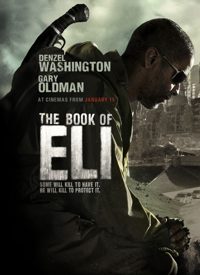
Strewn with Christian themes of protecting God’s word from attack and from manipulation at the hands of “Big Brother,” The Book of Eli is set in the post-apocalyptic wasteland that was once the United States. After the final war, the Bible was perceived as a threat, and was sought and burned.
As Eli owns the last remaining King James Bible, God calls upon him to carry it from the East to the West Coast, where Eli and the Bible will be safe. Armed with spiritually bestowed near super-human battle skills, Eli is caught in a battle of good and evil against Carnegie, a man who intends to steal the Bible to fulfill his own evil motives.
Played by Hollywood’s notoriously Christian two-time Academy Award-winning actor Denzel Washington, Eli is one of the few survivors of the final war. Most of the other characters were born long after the war had ended. The world in which he finds himself is that of destruction, lawlessness, and fear, characterized by the presence of gangs who own the roads and are prepared to rape, murder, and burglarize any traveler that passes.
Along his journey, Eli comes upon a makeshift village headed by Carnegie (Gary Oldman). Carnegie promised civilization, protection, food, and water to the people of his village in return for their blind loyalty and servitude. Carnegie’s village is totalitarian in nature. The women are treated as sexual commodities, and no one seems to outwardly question Carnegie’s policies. Gang warfare is encouraged to maintain a level of fear in the villagers, and Carnegie alone benefits from whatever his gang pillage from travelers. Carnegie has claimed for himself a mistress, a blind woman named Claudia (Jennifer Beals) with a daughter named Solara, played by Mila Kunis. Like the other women in the village, Solara is treated as a prostitute, and is abused along with her mother if they do not give into Carnegie’s every demand.
Carnegie’s mission to seek out the remaining copy of the King James Bible is driven by his desire to utilize the book to manipulate the masses. Using God’s word, Carnegie hopes to instill fear in the people and, in doing so, secure a permanent position as leader. He sends his gang to the roads to find it. Once Carnegie discovers that it is Eli who possesses the Bible, a thrilling, suspenseful, and often violent chase ensues. Solara, who is intrigued that Eli is one of the few survivors from the war, believes that he can offer her a glimpse from the past and hope for the future. Trusting her instincts, she accompanies Eli to the west.
Eli often finds himself torn between his nonviolent beliefs as a Christian, and his need to violently defend himself against evil-doers. Eli’s violent acts are only in self-defense, and Eli himself does not once use vulgar language of any sort. Unwilling to become distracted in his journey, however, Eli often ignores others in need. It isn’t until the end that he realizes it isn’t just the physical Bible that requires protection, but the Bible’s teachings as well.
Dark and dismal, and with long spans of minimal dialogue, the movie forces the viewers to consider their own faith, and how far they would go to protect God’s word. In a world of depravity, sin, and selfishness, Eli is a warrior who aims to bring the world back from the depths of hell. Moviegoers will find themselves utterly engaged and rooting for Eli every step of the way.
In Hollywood, where sacrilegious movies such as Hamlet II, Dogma, and Religulous are born, and are the norm, The Book of Eli is a refreshing change of scenery.




